Are you struggling to know: how to remove water stains from marble and restore its flawless beauty?
Marble, renowned for its timeless elegance, often suffers from water stains that can dull its natural radiance.
But fear not, reviving its stunning glow is simpler than you might think.
Here are our expert tips on how you can simply deal with the water stains on marble.
Let’s uncover how to effortlessly reclaim your marble’s splendor!
What Are Hardwater Stains On Marble?
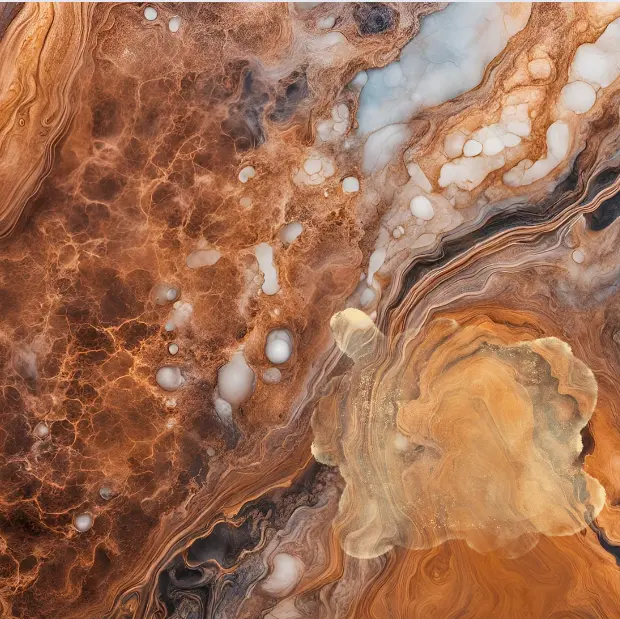
Hard water stains on the marble occur due to the heavy deposition of the minerals like magnesium and calcium.
The sources for these minerals are basically from the hard water and they appear as the cloudy spots on marble.
- Formation: When the hardware evaporates, it leaves the sediments back as mineral deposits creating unsightly marks.
- Impact: Over time the minerals turn acidic and fade away the natural marble finish,
Suggested Read: Remove Water Stain From Fabric Couch: 16 Quick Solutions!
Types of water stains on marble kitchen
There are multiple types of water stains on Marble, here are the top 5, and figure out which one you are dealing with:
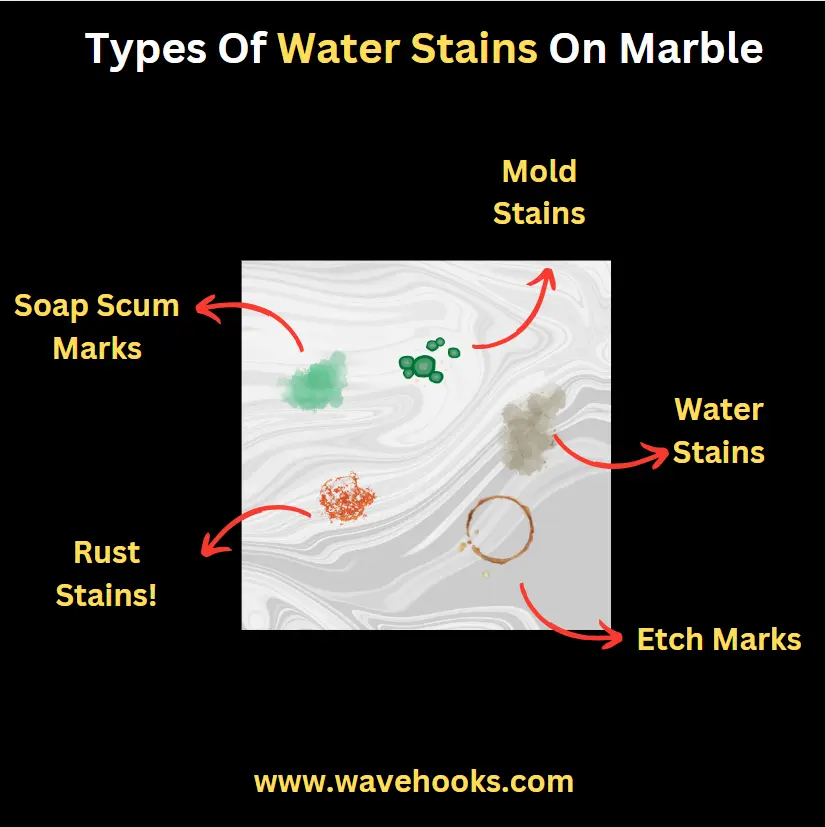
1. Hard Water Stains
The special formation of the minerals like Magnesium and Calcium mainly causes them.
- Appearance: Cloudy spots on marble are white, and there is a steaky formation.
- Cause: Quick water evaporation leaving the minerals deep in the marble.
2. Etch Stains On Marble
Etch stain is basically a surface damage formed on the top layer of the marble.
- Appearance: The dull spot or the ring formation on the marble, noticeable under light exposure
- Cause: Contact with acidic substances in water or even thick lemon juice or vinegar reacting with CACO3 can cause this damage.
3. Rust StainsOn Marble
These stains are caused by the rich iron content in the water or the objects that are in close contact with marble.
- Appearance: They are reddish-brown tinted hard stains
- Causes: Moisuture and the wet surface in contact with iron will result in oxidation of iron leading to stains.
4. Soap Scum Stain On Marble
This is a thin film formed with the soap residues mixed with the hardness of the water
- Appearance: They are white filmy residue that is easily spotted
- Cause: Leaving the soap unattended in direct contact with the marble for a prolonged period.
5. Mildew and Mold Stains
They mostly appear where there is high moisture and less ventilation and where there is minimum sunlight.
- Appearance: They can be in various colors like brown, green, and the black spots
- Cause: Excess moisture can react with the organic materials providing the nest to to mold to grow.
Suggested Read: Does Sunlight Kill Mold: How Well Is Sunlight Against Mold?
Will water stain on marble go away?
Yes! Water stains on marble go away by following a few effective cleaning methods.
But, this thing depends on the type of stain and the minerals it settled in.
Sometimes home remedies might work and some times may not!
So before reaching professional, I’d like to let you know the steps to follow to clean your water stains on marble.
Step by step on how to clean your water stains On Marble
Here is the step-by-step guide on how to clean your water stains on Marble:
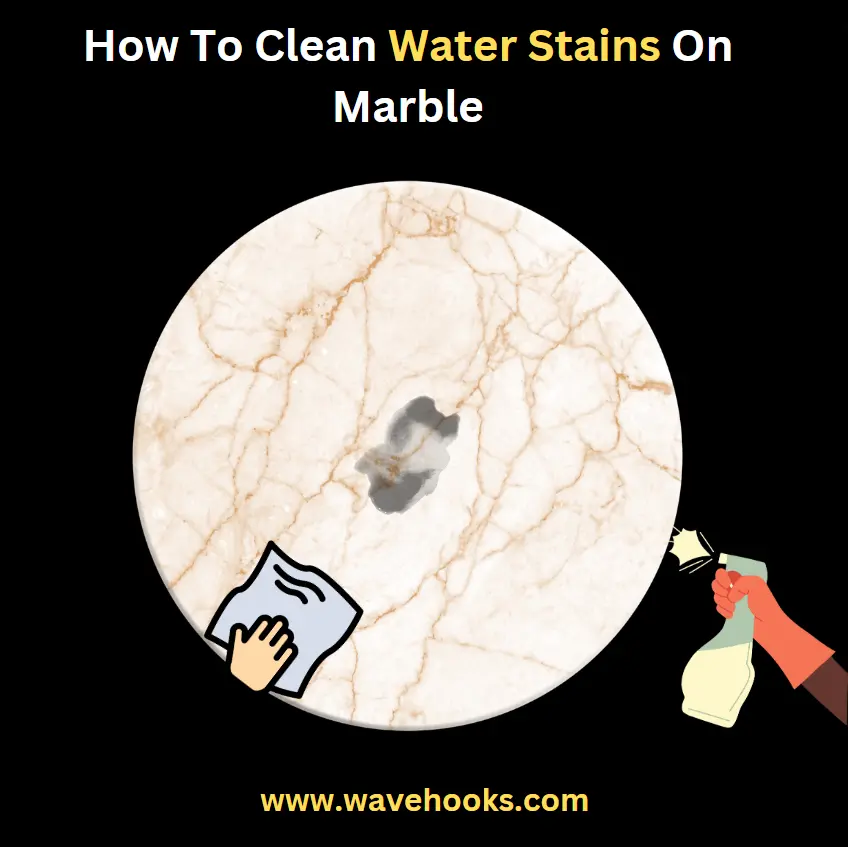
Step 1: Access the situation
You need to closely observe the stain and recognize what is it.
You can touch the stain and feel how deep it is and follow the next step.
- Tip: Check the above section to find different types of stains on Marble!
Step 2: Curate Your Cleaning Process
You can simply add a few drops of the dishwasher or the floor cleaner and deep clean the surface. If still persists you can follow the below section for more tips.
Step 3: Gently Clean and Polish
After cleaning, you need to take a microfiber cloth or a cotton ball and gently rub on the stain to lighten it.
Never ever over-scrub, this can leave deep scratches. After the process lightly sprinkle water
Step 4: Seal The Magic
After the above step, in most of the cases stain will fade away.
To keep this marble more printing you need to use marble fillers or the marble sealant to apply over the surface for a special shine.
Suggested Read: How To Get Wax Off Laminate Floor: 8 Steps For Clean Shine!
DIY Methods to Remove Water Stains from Marble: 10 Efficient Methods!
Here are the simple DIY methods to remove water stains from marble.
They are not only effective but can help you maintain your home marble shine and aesthetically appealing.
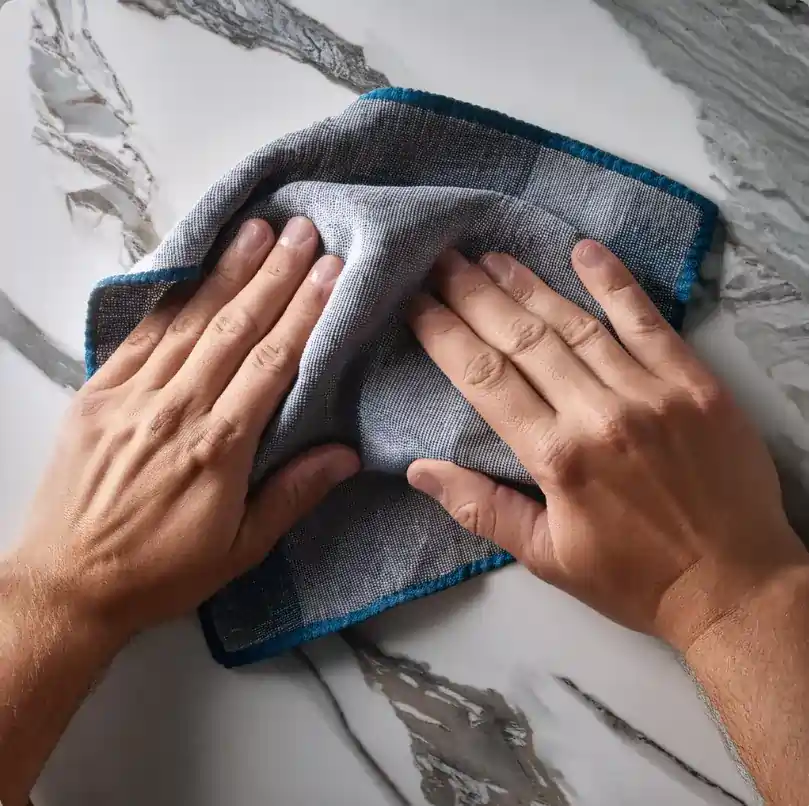
1. Hydrogen Peroxide
- How To Use: Dab hydrogen peroxide on the stain with a soft cloth. Let it sit for 4-6 hours, then rinse and dry.
- Why It Works: Hydrogen peroxide acts as a gentle bleaching agent, breaking down organic stains without damaging marble.
2. Diluted Ammonia Solution
- How To Use: You need to mix up Diluted ammonia in the filtered water and apply this to the stained area followed by rinsing.
- Why It Works: Ammonia is a strong agent to dissolves mineral deposits and fades away stains.
- Caution: You need to be very careful as there is a chance for ammonia to create an etching impact on marble.
3. remove water stains from marble with baking soda
- How To Use: Mix an organic baking soda with warm water and make the paste. Apply on to the stain and leave it for 24 hours straight.
- Why It Works: Baking soda has the nature of abrasiveness, which can help in clearing out stains.
4. Cornstarch To Remove Water Stains From Marble
- How To Use: Just take a pinch of corn starch and damp it with the filtered water. Dab the cotton into this mixture and apply it to the stain. leave this for 30 minutes and wipe off using soft cloth.
- Why It Works: Cornstarch has the ability to absorb the oils which will help the stain to lose its firmness on marble.
5. Remove Water Stains On Marble Using White Vinegar
- How To Use: Dilute the white vinegar in a 1:3 ratio and damp cloth into this solution to apply to the water stain.
- Why It Works: Vinegar has a mild acidity which can dissolve all the settled minerals and can fade away the stain.
6. Acetone To Remove Hard Water Stains
- How To Use: Simply dab acetone filled bowl with a cotton ball and apply in the to and fro motion on the water stain
- Why It Works: Acetone effectively dissolves oil-based stains without damaging the marble surface.
7. Talcum Powder and Hydrogen Peroxide
- How To Use: Take any regular talcum powder mix it with the hydrogen peroxide and create a thick paste to apply on the stain.
- Why It Works: Leaving this for 24 hours can absorb the moisture and lead to the breaking down of the tough stain.
8. Clay-Based Cleaner To Remove Water Stains From Marble
- How To Use: Clay-based cleanser is mostly preferred for stone surfaces. You just need to apply this cleanser and let it settle for 3 hours.
- Why It Works: They absorb the stain firmness and all the contaminants without damaging the marble. They also have a decent smell to put your house in order.
9. Milk and Flour Paste
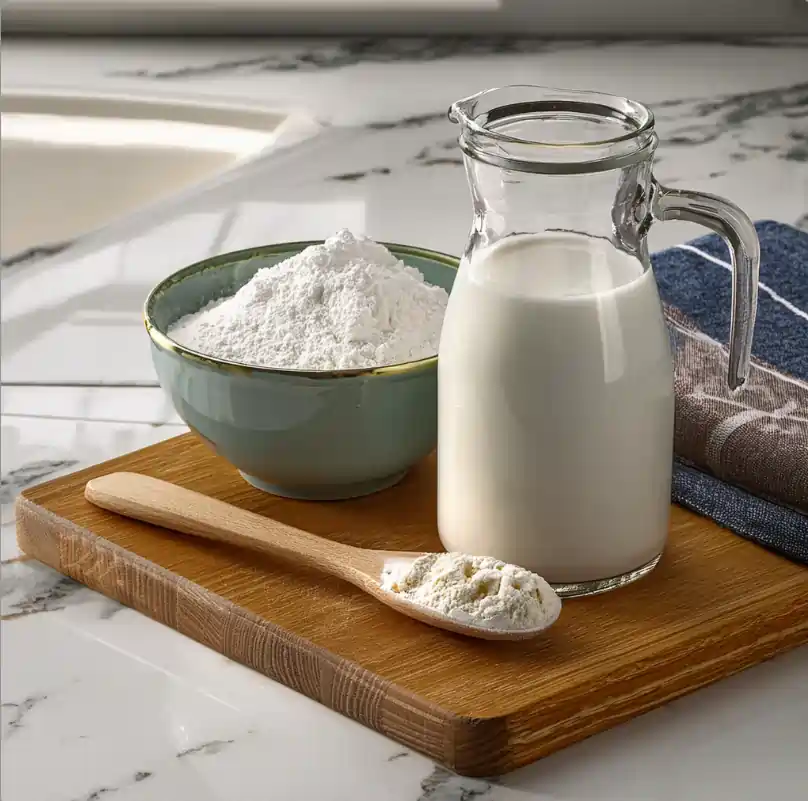
- How To Use: You need to take raw milk, mix it with the flour, and apply it to the stain. Cover this up with a plastic or vinyl wrap for straight 24 hours.
- Why It Works: Milk’s lactic acid and flour’s absorbent properties help lift and remove stains.
10. Wheat Flour Poultice
- How To Use: Get the wheat flour mix it with the distilled water and leave the paste for 24 hours on the stain.
- Why It Works: Wheat flour helps to absorb moisture and stains from the marble surface.
11. Coconut Oil To Remove Water Stains From Marble
- How To Use: Take edible coconut oil on a soft cloth and rub gently in circular motions onto the marble stain
- Why It Works: Coconut oil helps to lift stains and polish the marble without abrasive action.
12. Glycerin and Water To Remove Water stains From marble
- How To Use: Mix the glycerin in a 1:1 ratio apply this to the stains and gently rub bihourly.
- Why It Works: Glycerin helps dissolve stains while being gentle on marble surfaces, minimizing the risk of damage.
Suggested Read: How to Remove Stubborn Stains from Clothes: 5 Laundry Hacks That Really Work.
Prevent water stains on marble: 5 Very Effective Ways!
‘Prevention is better than cure’. So, it is better to prevent the stains rather than act on them afterward.
Here are the 5 effective ways to prevent water stains on marble.
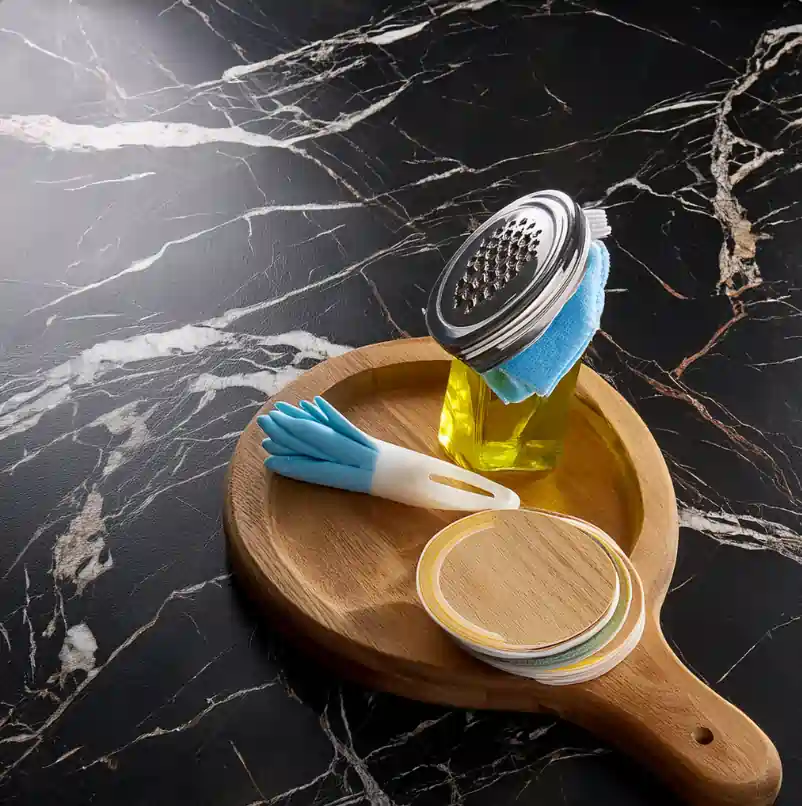
1. Regular Sealing To Prevent Water Stains On Marble
- How To: You need to try a marble-specific sealer that won’t let the stains settle deep. Reapply every 6 months!
- Why It Works: Sealing creates a protective barrier that repels water and stains, reducing the risk of discoloration and damage.
2. Immediate Spill Cleanup
- How To: Never react late, whenever you see stagnant water, take a mop or a soft cloth to wipe the area.
- Why It Works: Quick action prevents liquids from seeping into the marble and causing stains or etching.
3. Use Coasters and Trivets
- How To: Use stylish coasters and the rivers for hor dishes as well as the beverages on the marble counter tops.
- Why It Works: Protects the marble from potential stains and heat damage that could lead to discoloration and surface etching.
Recommended: Check This Beautiful Linen Coster For Home!
4. Regular Cleaning with pH-Neutral Products
- How To: You need to regularly maintain the marble surfaces with PH-neutral cleansers or mild detergents.
- Why It Works: pH-neutral cleaners clean effectively without causing etching or damaging the marble’s finish.
5. Place Mats and Covers
- How To: Place the mats and protective layers where you feel there is a high chance of spillage and usage.
- Why It Works: Provides an additional layer of protection against spills and stains, minimizing direct contact with the marble surface.
Suggested Read: How To Prevent Orange Stains In Shower: 15 Professional Tips
what cleaners should not be used on marble?
Though cleansers are very efficient in keeping the marble from water stains.
Here are a few cleansers that act adversely by damaging your marble. Check the list to know:
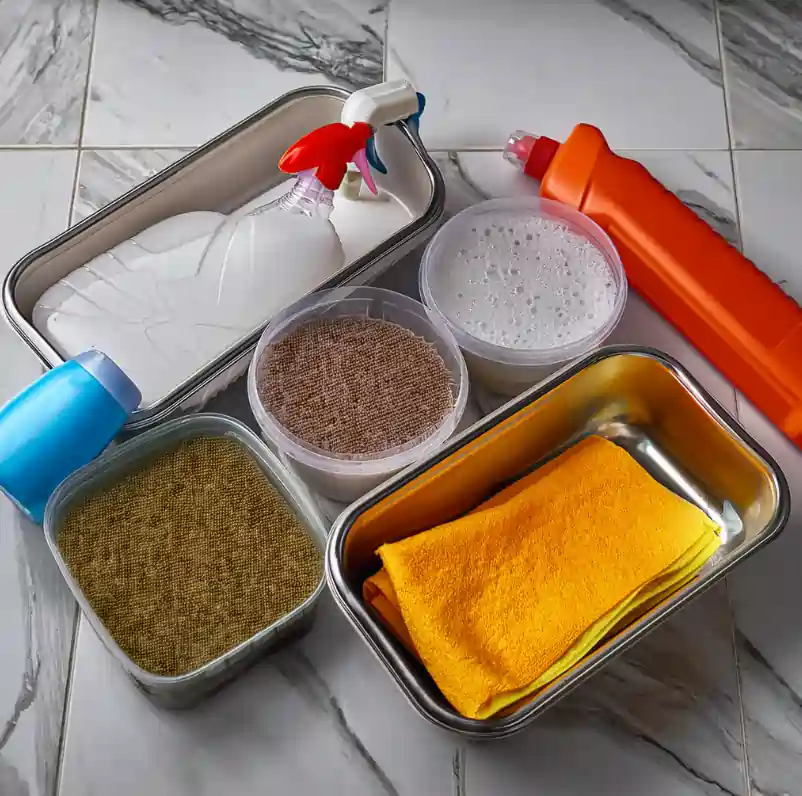
1. Acidic Cleaners
Hard Vinegar, lemon juice, or any cleaner with acidic properties can etch and damage marble.
The acid reacts with the calcium carbonate in marble, leading to dullness and discoloration.
2. Abrasive Cleaners
You must not use scouring powders, deep scrubbers, or abrasive pads which can create a scratch on the surface.
Added Tip: Use a microfiber cloth or cotton-induced mops for better results on the marble.
3. Never Use Hard Bleach
Bleach is too harsh for marble and can lead to discoloration or weakening of the marble stone. It’s best avoided entirely.
4. Lab Grade Ammonia
Though this is one of the finest stain fighters, without diluting you cannot directly apply on to the stain.
This can only be used when the stain is over the protective sealant, over using can surely affect the aesthetics of your marble.
5. Heavy Oil-Based Cleaners
Most of the cleaners leave shiny oil on the surface, you cannot use them to clean your marble as they can leave residue stains which are harder to remove than the water.
6. Avoid Glass Cleaners
There is a constant misconception that glass cleaners are effective in removing water stains on marble.
But they contain alcohol and strong ammonia which can formulate and damage the marble.
7. Avoid Unnamed Cleaners
Never use ordinary cleaners which may have harsh chemicals that also show the nature of abrasiveness to damage the marble in the short run.
Suggested Read: How Do You Clean Unfinished Wood Floors: 11 Simplistic Ways!
how to remove water stains from the marble coffee table?
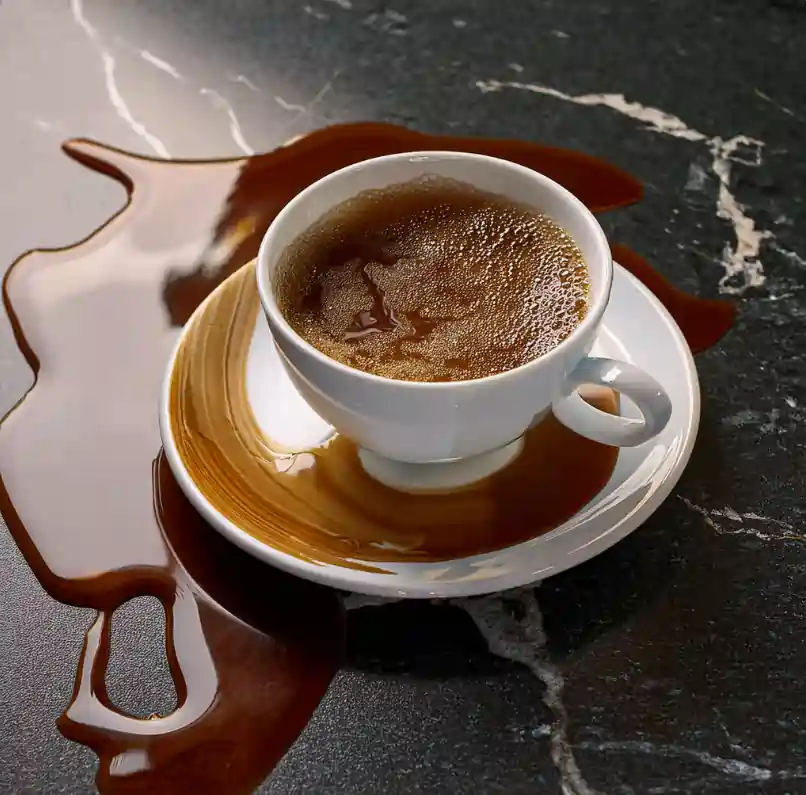
This is the most commonly asked question, as a Marble coffee table is more prone to liquid spills.
For this, you need to understand the stain. If it is a water stain grab a potato slice and rub it thoroughly and rinse it off with a soft cloth.
If still the stain is persistent you can apply the baking soda paste and rinse off spraying distilled water.
how to remove water stains from marble shower?
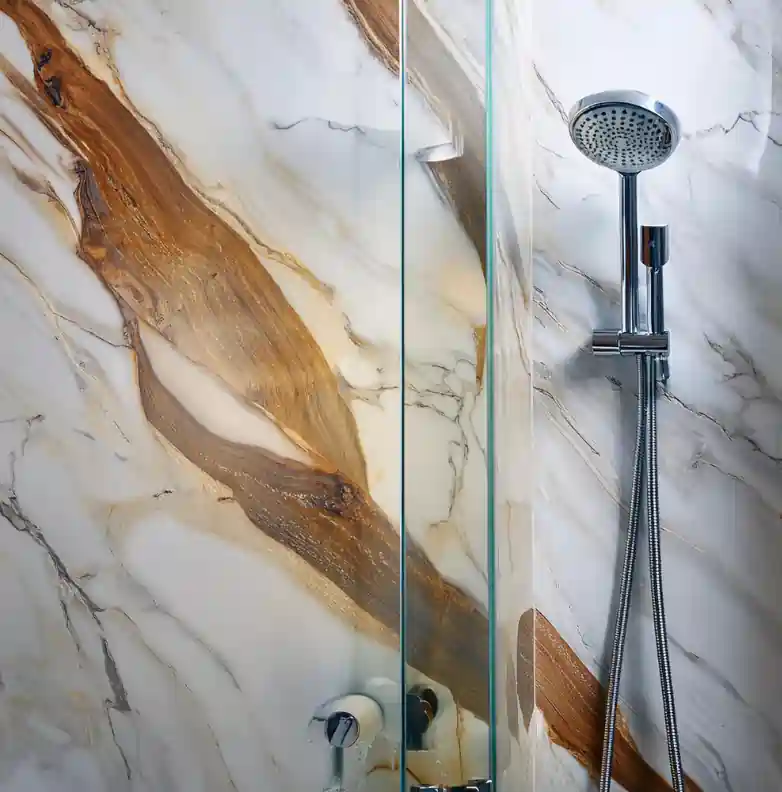
To remove water stains from the marble shower you need to use pH-neutral stone cleaner or a mild soap liquid.
Simply mix with the lukewarm water spray directly onto the stain and rub with a soft cloth.
Let it dry and reapply 2-3 times till the water stains from the marble fade off.
When To Call A Professional To Remove Water Stains From Marble
If the DIY methods to remove water stains from marble fail, you need to immediately consult a professional.
By any chance, if your marble is expensive like Onyx, you must better avoid even trying DIY tips besides the soft water rub.
Periodic maintenance once in 6 months is recommended for better results and the shine of marble.
Suggested Read: How To Get Blood Out Of Sheets: 15 Special Secrets Unveiled!
FAQs On How To Remove Water Stains From Marble

1. why drying your marble surface important?
Yes! Quick-drying marble surfaces can help in getting away with the deep water stains and potential etching.
2. Stain vs etches On Marble?
Stains are the discoloration caused by external substances. While etches are the direct surface damage from the acidic contact.
3. how to get water rings out of marble?
Gently buff the area with a soft cloth and a marble polishing powder, then rinse and dry.
4. What is the easiest way to clean marble?
Use a pH-neutral cleaner or mild dish soap mixed with water and a soft cloth.
5. Can I prevent water stains with daily maintenance?
Yes! By wiping up spills immediately and regularly drying the surface, you can prevent water stains.

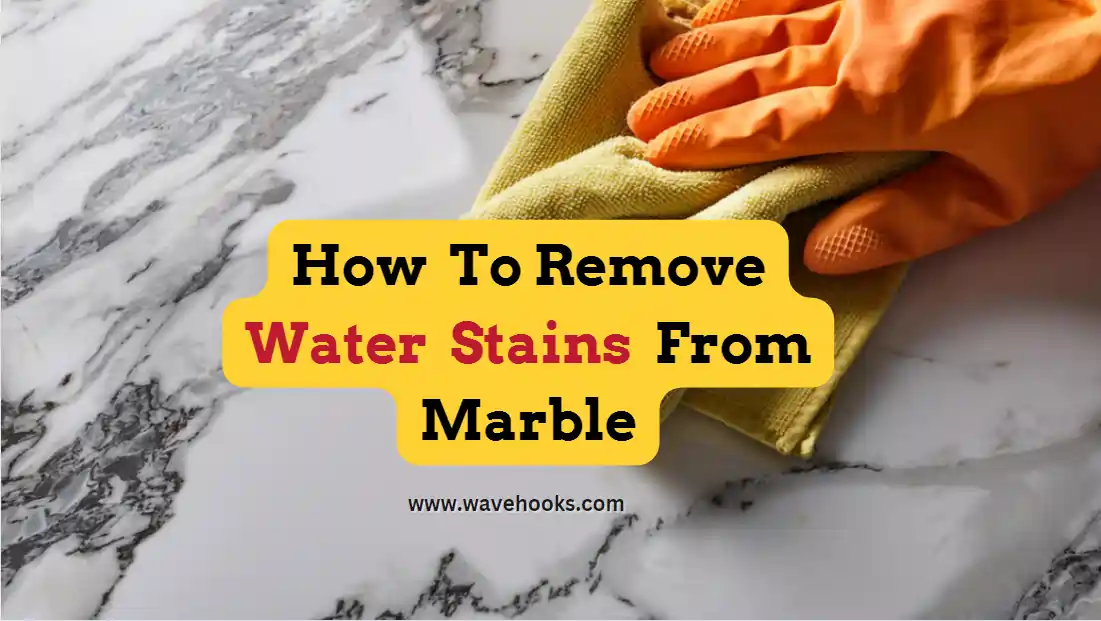






3 Comments